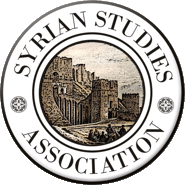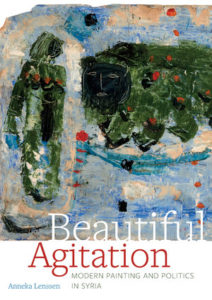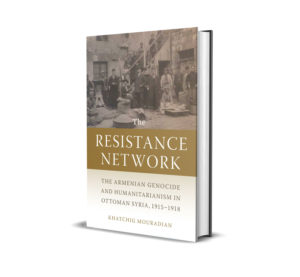Historian Khatchig Mouradian’s book The Resistance Network has received Honorable Mention 2021 from the Syrian Studies Association Prize Committee.
The committee, composed of professors Dawn Chatty (University of Oxford), James Reilly (University of Toronto) and Michael Provence (UCSD), deemed The Resistance Network “long awaited,” noting that “somewhere along the way we lost sight of the Armenian resistance network. This book is one great step in recovering that past.”
“Turning away from the images of the helpless and passive victims of genocide, Mouradian promises us an opportunity to see the resistance and agency of Armenians in the years between 1915-1918,” the committee noted.
Historian Anneka Lenssen’s Beautiful Agitation: Modern Painting and Politics in Syria won the “Best Book Prize 2021.”
Below is the full text of the Syrian Studies Association’s announcement.
***
 2021 Syrian Studies Association Book & Article Prizes
2021 Syrian Studies Association Book & Article Prizes
The Syrian Studies Association awarded its 2021 book and article prizes for the best works in Syrian studies during the annual Middle East Studies Association meeting held on Zoom. Awarded annually for over 15 years, the awards recognize scholars whose recent work has made a particularly distinguished contribution to the field of Syrian Studies. Recipients receive a financial prize and a mention in the Syrian Studies Association’s Bulletin.
Best Book Prize 2021
 Anneka Lenssen, Beautiful Agitation: Modern Painting and Politics in Syria. Oakland, CA: University of California Press.
Anneka Lenssen, Beautiful Agitation: Modern Painting and Politics in Syria. Oakland, CA: University of California Press.
This is a truly remarkable work: original, creative and deeply contextualized into the modern political history of Greater Syria. It is a work of particular significance as it endeavors successfully to bring natural Syria, Bilad al Sham, into our frame of reference through the work of three main artists: the Arab Romantic Khalil Gibran, the political spiritualist and revivalist, Adham Ismail, and the ‘excavationist’ of people and history, and Fateh al Moudarres, with his unholy images. It is much more than a book about art production. In its early chapters, it skillfully describes and analyses, Syria’s interface with the late Ottoman period of and the counter-orientalizing which was occurring at that time. The Interwar Mandate period is particularly well researched and articulated in drawing Syrian plastic arts into view, as France and other European diplomats, philosophers and anthropologists’ (here she identifies the extraordinary significance of Henri Bergson, Levy-Bruhl, Marcel Mauss) influence upon individual Syrian artists, poets and philosophers either during their sojourns in Europe or at home in Syria. Her analysis of the way in which the mystical- Islamization of form and representation promoted by Louis Massignon, a French scholar of comparative mysticism, had a direct role in planning the French Institute’s mission in Syria as well as critiquing the efforts of Eustache de Lorey in setting up the French Institute of Archaeology and Islamic Art is particularly astute. The story of de Lorey’s uncovering of the astonishing 8th century mosaics on the western portico walls of the Great Mosque of Damascus is typical of her authoritative and sympathetic telling. In his effort to draw France and Syria closer together during this period of mandatory authority, Massignon promoted the expanse of the mosaics to the scale of an oil painting thereby framing the nested roofs of the Umayyad dream structure as analogies of a modernist village scene. Beautiful Agitation is an enchanting read, scholarly and lively, making sense for the first time of important Syrian artists’ lives in the context of an era which saw dramatic political, social, and economic change over a period of fifty years in the 20th century.
Honorable Mention 2021
 Khatchig Mourdian The Resistance Network: The Armenian Genocide and Humanitarianism in Ottoman Syria, 1915-1918. East Lansing: Michigan State University Press, 2021.
Khatchig Mourdian The Resistance Network: The Armenian Genocide and Humanitarianism in Ottoman Syria, 1915-1918. East Lansing: Michigan State University Press, 2021.
This book offers us an unusual approach to the history of the Armenian Genocide. Turning away from the images of the helpless and passive victims of genocide, Mouradian promises us an opportunity to see the resistance and agency of Armenians in the years between 1915-1918. And true to his endeavor, we do get a picture of the activism of the Armenian Church in Aleppo as well as the long-time Armenian residents of the city from the two brothers who owned and ran the Baron Hotel, as well as the charity and resistance of the well-off Armenians who came out to set up orphanages for those on the dearth marches, who hid them or in other ways employed Armenians to provide them with shelter in the city. The local connections with Jamal Pasha and his willingness to ’bend’ the orders from the CUP at least for a while provide a more nuanced picture of what happened during those awful months. This is a book long awaited, it provides details of what took place in Aleppo and between Aleppo, Raqqa and finally Deir ez- Zor, the graveyard of thousands of Armenians. Somewhere along the way we lost sight of the Armenian resistance network. This book is one great step in recovering that past.
Best Article Prize 2021
Ann-Christin Zuntz, “Refugees’ Transnational Livelihoods and Remittances: Syrian Mobilities in the Middle East Before and After 2011.” Journal of Refugee Studies Vol 34 (2): 1400–1422.
This well-crafted article, based on ethnographic fieldwork, explores how Syrians’ pre- war kinship-based ties and economic networks largely framed the livelihood strategies of displaced Syrians in Jordan after the conflict induced displacement of 2011 and beyond. Zuntz argues persuasively that the seasonal migration of the rural poor in Syria to Jordan prior to 2011 continued to be a major source of networking in order to access jobs in agriculture and the humanitarian sector post 2011; and to distribute income through these same kinship based cross border networks. For those who are familiar with the ties across the borders imposed upon Bilad al-Sham post WWI these findings come as no surprise. Yet the clarity, empathy and academic rigor with which Zuntz presents her arguments make this an exceptional article indeed.
Honorable Mention 2021
Pieter Coppens’ “A Silent uṣūl Revolution? Al-Qāsimī, iğtihād, and the Fundamentals of tafsīr,” MIDÉO no. 36 (2021): 21-61.
The article is a deeply researched investigation into a furious late nineteenth century debate among Damascene religious scholars. The article is both a well-written and gripping account of late Ottoman intellectual life and a learned exploration of a now-forgotten scholarly debates. Coppens manages an article that is exciting to read, impressive in its research, and charmingly understated in its presentation. It is a deeply rooted yet innovative masterpiece of intellectual history.
"network" - Google News
November 22, 2021 at 12:51AM
https://ift.tt/3kYAPOB
'The Resistance Network' receives 2021 Syrian Studies Association honorable mention - Armenian Weekly
"network" - Google News
https://ift.tt/2v9ojEM
https://ift.tt/2KVQLik
Bagikan Berita Ini















0 Response to "'The Resistance Network' receives 2021 Syrian Studies Association honorable mention - Armenian Weekly"
Post a Comment